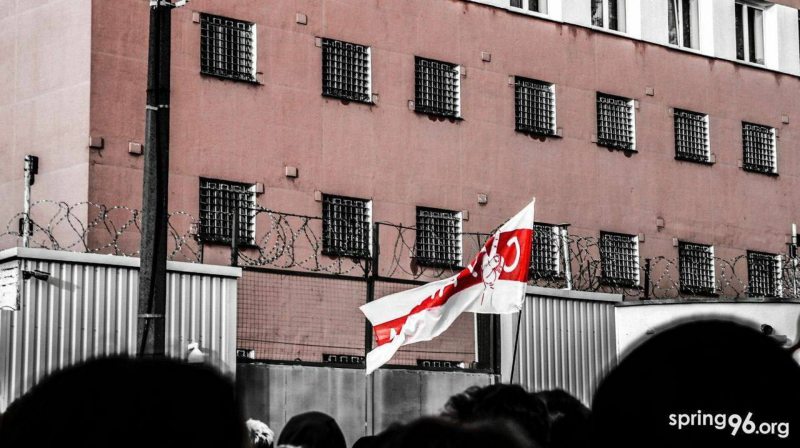"Until you exit the gate, you don't know if they will detain you for more days or if there's already a criminal case," a former prisoner
Antos (name changed for security reasons) was detained in mid-January 2024 for protest activity in previous years. He managed to avoid criminal prosecution, but an administrative case was still initiated against him on trumped up charges of "hooliganism in the police department". The Minsk resident told Viasna about the difference between a regular cell and a political punishment cell in the Center for Isolation of Offenders at Akrescina, his cellmates at the end of January, and shared what was the most difficult thing in detention.

- Illustrative photo by spring96.org
The man was serving his days of detention in two cells of the Center for the Isolation of Offenders at Akrescina. Antos says that the first cell was ordinary, "not political", but the second one had poor conditions created on purpose for political detainees. So he compares them.
"The first cell had hot water, a toilet, and a bunk bed without mattresses. But the cell was almost always crowded: there were about two times more people than beds. So I had to sleep on the floor, on benches, and we took turns at night. Despite the fact that I was detained when it was cold, it was warm enough in the cells; the heating worked, so one sweater was enough to keep me warm. Political prisoners had to give away their jackets at the entrance. So when new people entered the cell, we immediately knew who were "our men" and who were not."
The second cell, where the man served his days of detention, was a punishment cell for one person, where six to twelve people were held at the same time.
"The "political" cell had worse conditions. It was a punishment cell for one person with an area of about 3x5 meters. There was no furniture, except for one stool, no hot water, and even no sink. So in order to wash something, you had to put water in a plastic bottle and wash the thing over the toilet."
Antos notes that the first and second cells even had different schedules:
"In the first case, the light was turned off at night; it wasn't in the second. Besides, there were two wake-up calls in the punishment cell during the night, and you had to get up and say your surname."
According to the man, the food was hardly tasty, but it was enough. Most of his cellmates compared it to eating in a very bad canteen. Antos recalls that the attitude of the employees in the Center for Isolation of Offenders differed: from neutral and indifferent to genuinely negative.
"Requests from our side were mostly ignored, so if there was someone with a regular violation in the cell, then it was them who made some requests, like leaving the "feeder" open or bringing toilet paper. For violations, the prisoners were punished with bleach. It looked like this: the door opened, and an employee poured water with bleach on the floor and closed the door. We didn't see the guards most of the day. But every morning there was a check: everyone was taken out of the cell, put against the wall and searched. At the same time, the cell was also searched. As a result, they could throw some random things away, for example, they decided that there were too many plastic bags or toilet paper in the cell and left only one item. At the same time, the employees talked to us exclusively by shouting orders with a lot of swearing and insults."
Antos divides his cellmates into two categories:
"The first category is more or less random: people who had a sticker on their phone, or a cover on their passport, or said "Long live Belarus" in front of the police, and so on. The second major category is people who made donations. Around this time, as far as I understood there, the security forces came to those who donated via PayPal.
However, there were many people with different stories: someone participated in the protests of 2020 and was filmed, someone because of a chat with friends. In some situations, people did not want to give details, but it is quite understandable. Age, education, and professions were also as diverse as possible. There were men from 18 to 60, among them were movers, IT specialists, businessmen, waiters. Almost everyone who contacted with the Main Directorate for Combating Organized Crime and Corruption was physically abused to some extent."
The man says that medical care could only be received in the form of pills once a day.
"It was possible to get the most basic medicines: Paracetamol, Analgin, or something of that kind. However, these pills were not always available (or they did not want to give them to us). Medical care packages arrived to my cellmates the next day. Then they were also given out a certain amount every morning."
At the same time, Antos notes that the most difficult thing for most was not the inconveniences of everyday life, but the absolute uncertainty in the future:
"Until you exit the gate, you don't know if they will detain you for more days or if there's already a criminal case. So the last days and hours before the release were the most difficult and stressful."

















